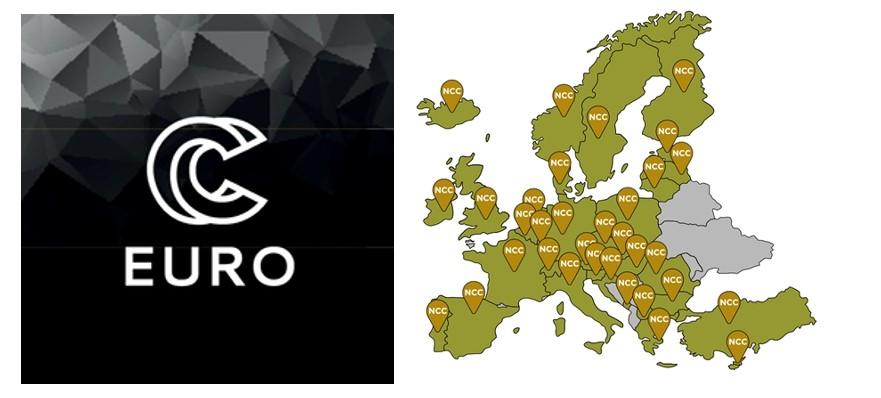
With funding from the European High Performance Computing Joint Undertaking (EuroHPC JU), the projects EuroCC and CASTIEL started in September 2020 for a two-year period. The projects aim at building a European network of 33 national HPC competence centres to bridge the existing HPC skills gaps while promoting cooperation across Europe.
Bastian Koller, the coordinator of the two projects, has answered some questions to present the first achievements of the projects already at mid-term.
What is the objective of the project EuroCC?
Within the EuroCC project, we are establishing national competence centres for high-performance computing – also known as NCCs. In each of the 33 participating countries, one NCC is created. The NCCs will act as single points of access in each country, i.e. gates between stakeholders and the national as well as the EuroHPC ecosystems: The NCCs will support users from academia, industry – in particular SMEs – and public administration in finding orientation in the vast field of supercomputing and related technologies, like high-performance data analytics (HPDA) and artificial intelligence (AI). The NCCs are mapping knowledge, resources and information about HPC/HPDA and AI in their country while being connected to each other and mutually expanding their competences. This establishment and exchange process will result in a strong European network, which is supported by the CASTIEL Coordination and Support Action.
Can you give very a concrete example of how a NCC can help its users from academia, industry or public administration?
Sure! For example, the NCC in Czech Republic helped an engineering company with a proof of concept for the application of computational fluid dynamics, or CFD, for catalysis processes. This collaboration was very successful and led to a follow-up project, funded by the Czech ministry of industry and trade, in which software tools will be developed. The NCC acted both as a provider of resources and expertise as well as a mediator to find the respective experts and connect them to the company.
What are the first achievements of EuroCC?
On the European level, the first big achievement is that the NCCs are now starting operations and work on their tasks. It is important to understand that the framework we are setting up is an enormous organisational effort. Furthermore, we now have an initial overview of the competences in each participating country. European collaboration among the centres has massively increased and we developed a common brand to represent EuroCC to the different stakeholders.
When we have a look at the national level, the success is of course to be seen in relation to the status of HPC in the country before the project. The NCCs have produced great results until now, and we are expecting to see many more as the project continues. Some NCCs organised extensive training programs, some have either initiated or massively expanded their collaboration with industry actors whilst some are now enabled to provide access to HPC services in a much better way
What is the biggest challenge you are facing in coordinating 33 national stakeholders?
One challenge is obviously to ensure a common language and understanding between the 33 nations and to support them in their work, by also ensuring a balance between a European strategic view and their national autonomy in needs and offerings. Obviously, another challenge came with COVID-19. Networking happens a lot in informal settings, like lunch at project meetings or a quick talk on the corridor. We had to substitute these networking moments, through virtual alternatives, e.g. NCC coffee breaks. This ultimately leads to a better cohesion between the project partners.
How is the development of this network of National Competence Centres supporting the ambition of the EuroHPC JU to make Europe a world leader in supercomputing?
For Europe to become a competitive force in HPC, it is necessary to join efforts in a coordinated way. With EuroCC and CASTIEL we are implementing an important pillar by addressing the competence and skills gap and supporting all nations to boost their capabilities in HPC and associated technologies. With this wide availability of expertise, we will foster the uptake of HPC/HPDA and AI by all users and accelerate the use of first-class high-end technologies in Europe’s aims for increasing its competitiveness.
More details
Started on 1st September 2020, the project EuroCC is running for a two-year period with a total budget of €57 million. Half of the budget comes from Horizon 2020, the Research and Innovation funding programme of the EU, while the other half will come from the 33 participating countries.
CASTIEL (Coordination and Support for National Competence Centres on a European Level) is also running for a two-year period, from 1st September 2020, with an extra Horizon 2020 funding of €2 million.
The two projects have been selected following the call EuroHPC-04-2019 and are coordinated by the High-Performance Computing Centre Stuttgart (HLRS), one of the three members of the Gauss Centre for Supercomputing (GCS).
Details
- Publication date
- 24 January 2022
- Author
- European High-Performance Computing Joint Undertaking